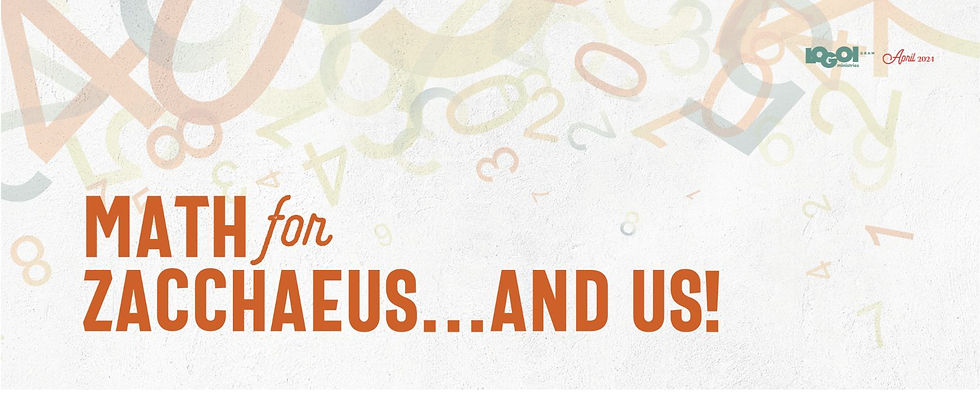
“This is too difficult for a mathematician. It takes a philosopher.”
—Albert Einstein, on filling out his tax returns
I suspect by the time you receive this letter you will have sent in your tax return. Many of us get quickly frustrated with the tax issues here in the good ol’ USA. When I was looking up “funny quotes” about taxes, it seems we’re in good company — and have been for a long time.

Al Capone said, “They can’t collect legal taxes from illegal money.” Plato said, “When there is an income tax, the just will pay more and the unjust less on the same amount of income.” And we know Jesus said, “Give to Caesar what is Caesar’s, and to God what is God’s” (Mark 12:17).
In my men’s group Bible study not too long ago, we talked about Zacchaeus, the much-despised chief tax collector back in Jesus’ day (see Luke 19). He had become rich from cheating his fellow Jewish taxpayers and further scorned for collaborating with Rome. Everyone, it seemed, hated Zacchaeus. (No doubt we can think of a public figure who fits the “Zacchaeus description” today.)
You know the story: Zacchaeus had climbed up the sycamore tree to try and see Jesus. Then, when Jesus shows up, he calls Zacchaeus by name — most likely the first time in a long, long time someone said his name in a kind way. Not only that, but Jesus also invites himself over for dinner at Zacchaeus’ house.
Much like today’s politically charged world, no doubt this scene sent shockwaves through the crowd of people. The last person Jesus should talk to, after all, was Zacchaeus. The last place Jesus should go to was Zacchaeus’ home. The last person to receive Jesus’ attention, let alone his love, grace, and forgiveness, should be Zacchaeus.
Imagine the smile on Jesus’ face when Zacchaeus came to faith in his Savior standing in his house.
As I write this letter to you, Andrés Cornelio comes to mind. He was a thug in a Mexican gang. No one wanted to cross paths with him in the dark or the daylight. He was one who seemed to joyfully carry out the unsavory deeds of his bosses. He was one of those “last people” we would ever think deserved God’s love or grace.
Then Jesus called his name and went to his house. Like Zacchaeus, his encounter with Jesus completely changed his life. He became one of our LOGOI Bible students and then a pastor.
Imagine the smile on Jesus’ face.
In my mind I quickly flip through story after story of men and women who most believed were the last person Jesus should ever talk to or visit. It’s hard to not smile and even laugh knowing that today they are part of God’s family, “heirs of God’s Kingdom” (Romans 8). Many have become pastors and leaders and missionaries while others joyfully proclaim the Gospel in their workplaces and communities.
Your prayers and financial partnership with us help “equip God’s people to do His work and build up the church the body of Christ” (Ephesians 4:12). Just think how we get to partner with our Lord in “going to the homes” of Zacchaeuses throughout the Spanish-speaking world. Imagine the smile on Jesus’ face.
Einstein said it takes a philosopher to try and understand taxes and I agree. But let’s quote a far more majestic philosopher when it comes to trying to understand why Jesus would ever call us by name:
“When I consider your heavens, the work of your fingers, the moon and the stars, which you have set in place, what is mankind that you are mindful of them, human beings that you care for them? You have made them a little lower than the angels and crowned them with glory and honor (Psalm 8:3-5).”
And by the way, while no one really understands our tax codes, there remains a provision for receiving tax deductions when giving to charitable organizations. Not only can it help reduce your taxes then but, as you give to God’s work via LOGOI, there’s a good chance He will use it on another Zacchaeus-type character.
Imagine the smile on Jesus’ face!
Forever!


P.S. Remember to download your copy of Carolyn Thompson's An Unexpected Love Story here. Add to cart and complete a brief form. You will then be able to download a PDF version of the book. Contact us for a printed version.

Comments